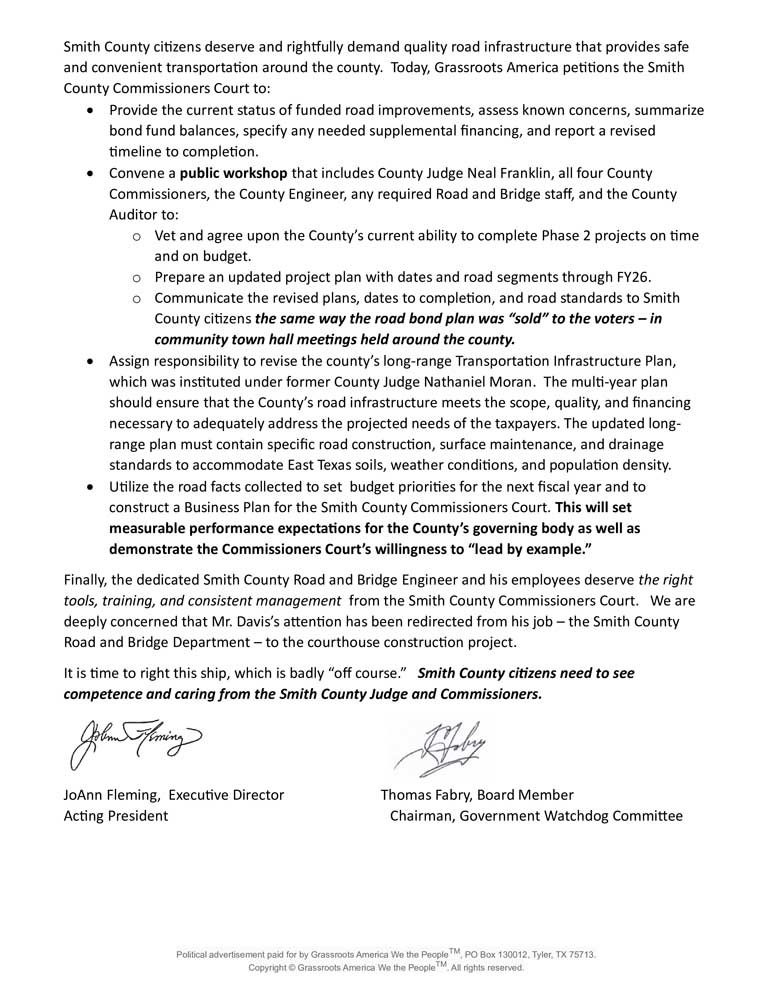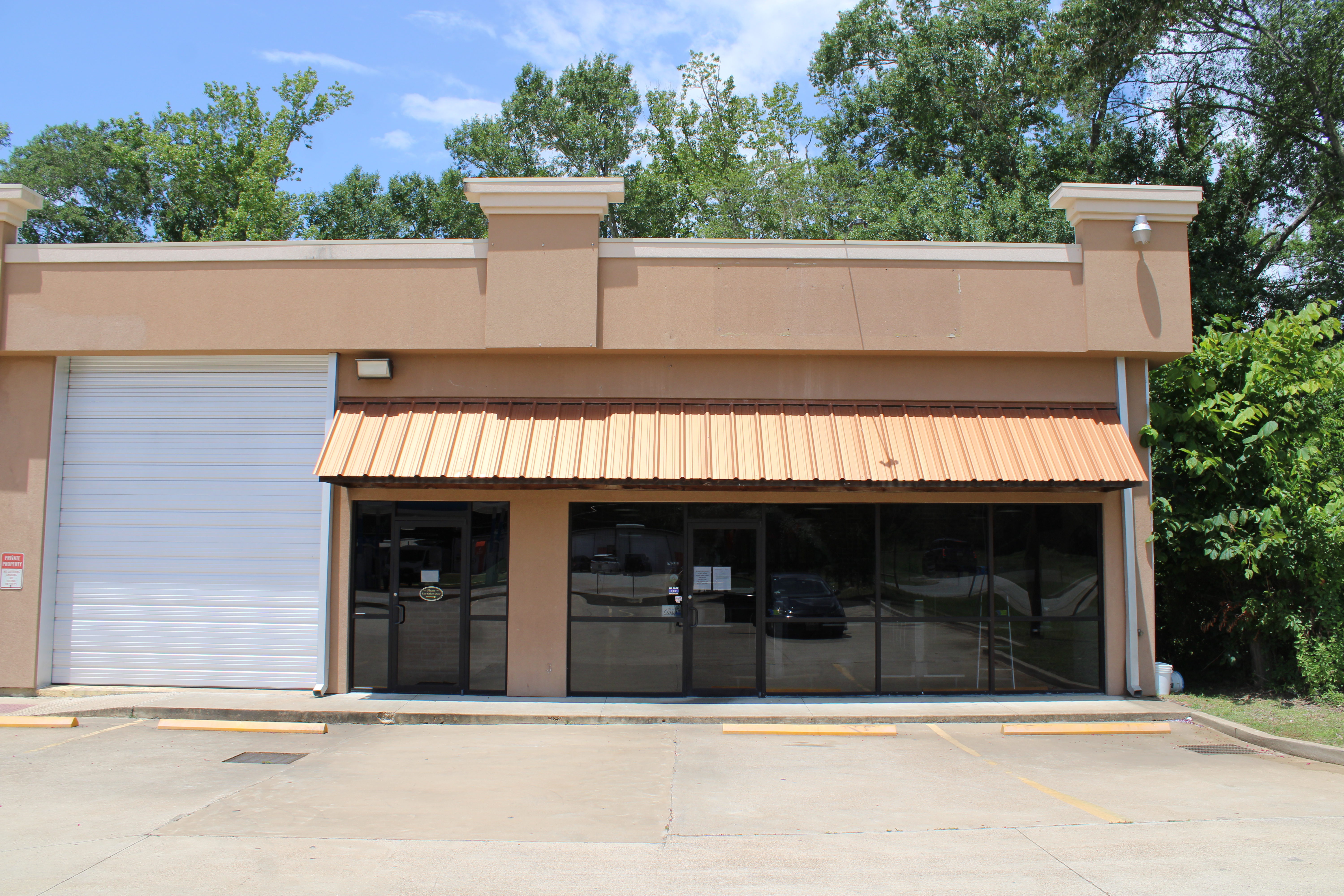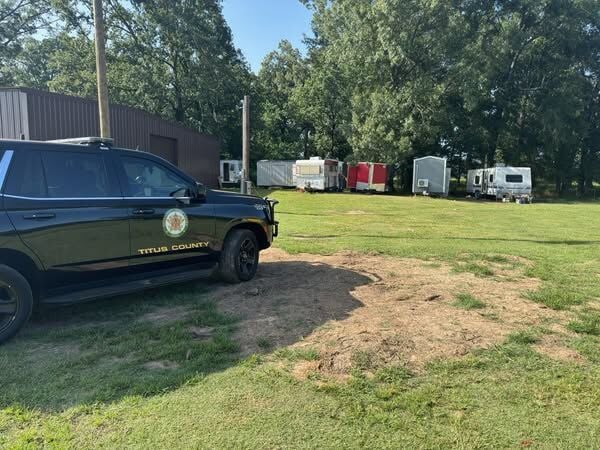Smith County officials respond to group’s concerns about road bond
Published 5:35 am Thursday, March 13, 2025

- Grassroots America calls for greater oversight and transparency in the road projects, recommending better communication with taxpayers and clearer financial reporting.(Contributed Photo)
At the Feb. 25 Smith County Commissioners Court meeting, Tom Fabry of Grassroots America raised concerns over the county’s road bond projects being behind schedule and over budget.
In response, county officials provided a presentation on March 11 to address these concerns.
“You need to be asking questions,” said JoAnn Fleming, Grassroots America: We The People executive director. “There are few questions that can only be answered in a closed session. The rest of it needs to be answered in public, because it’s the public’s business.”
The group also raised concerns about the improvements, saying some of the completed roads are already starting to break down or aren’t able to handle the current amount of traffic.
Grassroots America asked the court to gather the facts and share them with the public. In response, Auditor Ann Wilson and County Engineer Frank Davis gave an overview of the project, including the financial details and the progress of the work so far.
The total amount approved for Phase 1 and Phase 2 is $84.5 million, with $64.5 million already used. To repay the bonds, the county raises property taxes, which depend on the amount borrowed and the tax rate needed to cover the payments.
Bond allocation
The county issued bond funds in separate parts to avoid penalties, and each series of projects must be finished within three years. This plan also let the county put the interest earned back into the bond funds.
“The interest earned can be a really beneficial thing to the county if we are efficient with our time and ensure that we are completing the projects within the approximately three year window,” Commissioner Precinct 3 J Scott Herod said. “At the point in which we go over that approximate three years then we’re subject to pay that earned interest back.”
The county borrowed $64.5 million for the projects and still owes $51.5 million in principal and interest. The bonds from 2018 to 2021 must be paid off in 10 years, while the bonds from 2022 and 2024 will take 20 years to pay off.
Phase 1
In November 2017, voters approved a $39.5 million bond for Phase 1 of road projects.
Grassroots America raised concerns about differences between the 2018 project report and updated documents from January 2025. The group said there was a shortfall of 175 miles and $3.5 million in extra funding.
During the presentation, Davis explained the funds were moved to other planned projects after the 175 miles were found to not be eligible for bond funding.
Two unplanned projects were completed, including two bridge replacements costing $1,000,791 and professional services — like surveyors, right-of-way acquisition and engineering costs — that totaled $1,479,337.
“More than 376 miles of roads were improved,” a Smith County press release stated.
To meet the promised mileage goal, $3.5 million from the regular maintenance budget had to be used for the 175 miles of road.
Fabry pointed out that the 204 miles completed cost $193,000 per mile, while the 175 miles only cost $19,000 per mile. He thought the cheaper work seemed more like fixing potholes instead of rebuilding the roads, which was not what the bond funds were meant for.
“If we’re only fixing potholes with a bond issue, that is a grievous waste of taxpayer money,” Fabry said. “There seems to be no consistent standards or quality control effort when the projects are completed.”
Fabry and the action committee believe taxpayers didn’t get the road improvements they were promised, and that the bond money might not have been used wisely, in their opinion.
Phase 2
Phase 2 of the project started in November 2021, and the county issued $25 million of the $45 million bond. Out of the 282 miles of road improvements planned, 97 miles are finished. About 17 miles are under contract, and around 22 miles are still being planned.
About $11 million was moved from the general fund to make sure the road improvements were finished. With 145 miles still not done, Fabry worried the county might not meet its Phase 2 goals.
“This is a six year project. We’re about 19 months left in the six years,” Fabry said. “They under-delivered, even though we spent more money on Phase 1. They are way under delivering, and may not even be able to make it in Phase 2.”
There is still $20 million to be issued, which is expected to happen this spring and again next year, Wilson said.
Fleming said the questions being raised are ones every commissioner and the county judge should have already thought about. They have a responsibility to understand their own decisions and make sure they know all the details, she said.
“Whatever any taxing entity promises in a bond election, the minimum expectation is that they will do exactly what they said they would do,” Fleming said. “If they can’t, for some reason, they should start telling people why.”
County Judge Neal Franklin apologized for not requesting a public update on the road bond projects in some time, taking responsibility for recent concerns about transparency.
Inflationary pressures have increased material and labor cost, while weather and animal-related delays have further slowed some progress on the road projects.
Still, Davis said, the county is flexible with the program and, despite challenges, is dedicated to completing the road improvements promised in the bond projects.






